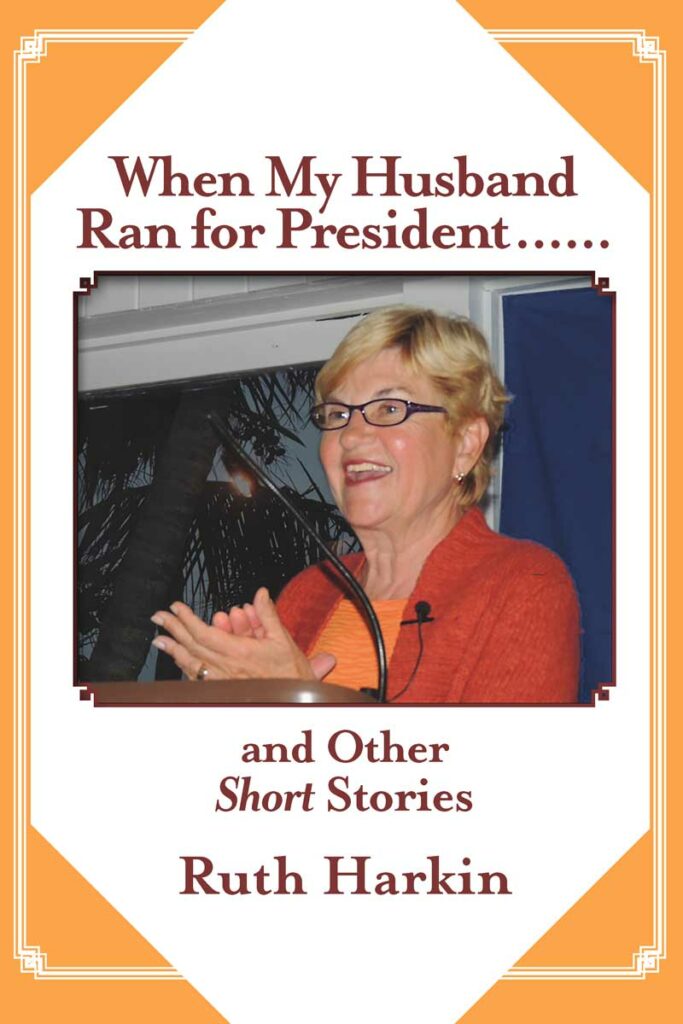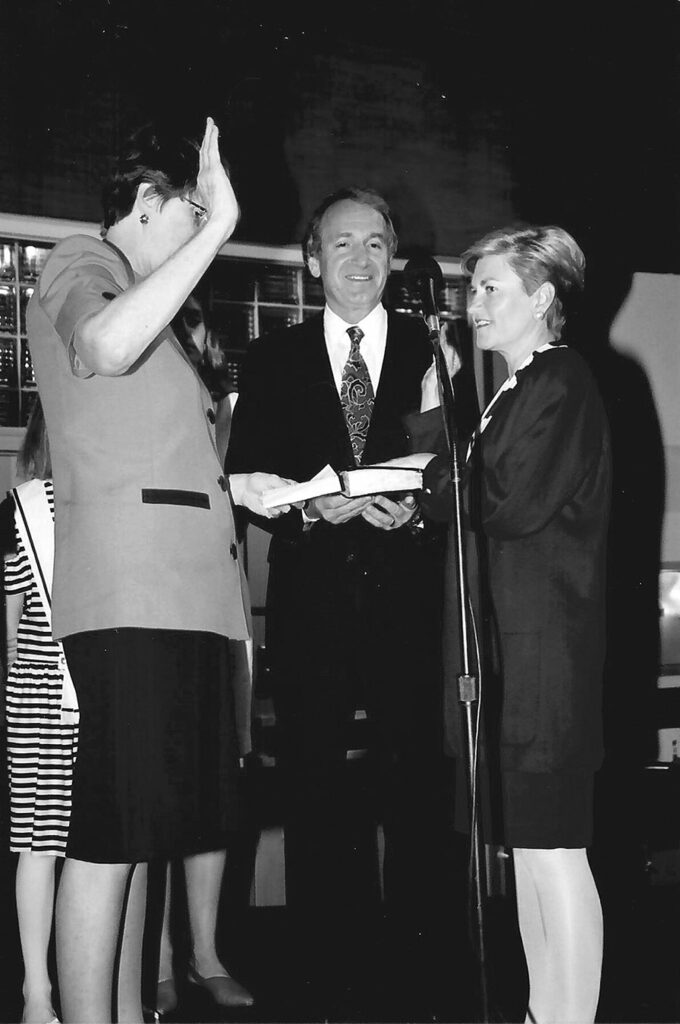Guest commentary: Women helping women
An excerpt from ‘When My Husband Ran For President and Other Short Stories’
BY RUTH HARKIN

Many Iowans may not know that Ruth Harkin was first elected to public office before her husband, former Sen. Tom Harkin. Ruth Harkin was the first woman to become the Story County attorney, and she worked to bring more women into the profession. Her new book, “When My Husband Ran for President and Other Short Stories,” published in September. In it, Ruth Harkin explores her early life, children, the women’s movement and careers, culminating in her and her husband founding the Harkin Institute and the Tom and Ruth Harkin Center at Drake University.
She has an upcoming book-signing event from 6:30 to 8 p.m. on Sept. 26 at the West Des Moines Public Library.
In August of 2018, Harkin was inducted into the Iowa Women’s Hall of Fame, sponsored by the Iowa Commission on the Status of Women, at the State Historical Society building in Des Moines. This is an excerpt from her speech at the ceremony, and in her new book it’s titled “Women Helping Women.”
Thank you for your kind and generous words! I am thrilled to be honored by the Iowa Commission on the Status of Women, which has been such an effective voice for women in our state. I want to thank my husband, sister, aunt, cousin and niece for traveling to be with me today. Also, thanks to so many good friends who are here today.
Women recognizing women, helping women and celebrating women has been a passion of mine throughout my life.
My first job was chopping corn out of beans in rural Minnesota. I was 14 and had to ask for the job, and I have been working at something ever since. I am among the first generation of women who pursued full-time careers outside the home and juggled career and family life. It was a debate among us, and many promising and well-educated women decided not to risk it — especially if it was not the economic necessity it increasingly is today.
Early on, I was motivated by a couple of guidelines. One, you have to be in the room to make a difference. A second guideline was to do what I wanted to do. Most of the work and jobs I have done, people told me I couldn’t do. I never listened to them. This has been liberating.
As a lawyer just out of law school, I was hired to work as a legal aid lawyer in Polk County beginning in November of 1972. In May, as I was studying for the Iowa bar exam, the Story County Democratic chair came to our house in Ames. Story County Democrats were notorious for not filling the ticket for county offices. She wanted to change that, and she asked me to fill the slot of county attorney. “I haven’t even passed the bar yet, and besides I am going to be a legal aid attorney,” I protested.
“That, my dear, is irrelevant. You couldn’t possibly win this race. There are no women county attorneys in any of the 99 counties, and in Story County there are no women attorneys except you. Not to mention that Story County in over 100 years of existence has only elected one Democrat, who was promptly defeated two years later. I am just asking you to help fill the ticket.”
That pretty well nailed it, and I said, “Sure, sign me up.” Well, against all odds, I won! The attorney general sent us letters titled, “Lady and gentlemen.”

I was now in the room, and it was a very good room, but I determined from the start that other women join me. Happily, more women began attending Iowa law schools in the 1970s. A male student once said to me, “I would really like to intern with you, but I hear you only hire women.” “That is absolutely true. I am the only woman out of 99. If I don’t hire women, who will?”
Over the next six years, women began joining the prosecutor ranks. My sister Sherry graduated from the University of Minnesota law school and became Winneshiek County’s first female assistant county attorney. When I completed my two terms, another woman succeeded me, and since 1972, women have been in the prosecutors’ rooms throughout our state.
When I moved to Washington, D.C., to join my husband with our 3-year-old daughter, Amy — daughter Jenny was born 2½ years later — I was told that whereas I might be a big deal in Iowa, my resume did not translate to a federal-level job. I became deputy general counsel at the Department of Agriculture. The secretary said he didn’t want me. “When I look at you, I see my wife, and she could never do this job.” I took the job anyway. After a couple of months, he apologized to me and said he had been wrong, and we became pals.
During my tenure, I got a call one day from the United States Office of the General Counsel in the vice president’s office. “I see that you have lawyers working part-time in your office.” “Yes, we have some extremely talented women lawyers who are mothers or becoming mothers. They are a bit daunted by parenting, work, traffic and child care but don’t want to leave the workforce, so I agreed they could work part-time.”
“Well, no one else is doing this in any of the other general counsel offices.” “It isn’t against federal regulations, is it?” I asked. “Well, no.” “That’s a good thing then, isn’t it? I will keep doing it.”
I was offered a presidential appointment to become president and CEO of the Overseas Private Investment Corp. (OPIC) in 1993. Composed of lawyers and bankers, this is an independent federal agency that promotes and supports private sector business investments around the world in politically unstable countries. No woman had ever headed this organization. OPIC did business with chief financial officers, heads of U.S. corporations and heads of state around the world — all men. But I had a big advantage: I had the authority and the money.
We were wildly successful by any measure due to our talented team, support from the White House and newly expanded jurisdiction, primarily because of the breakup of the Soviet Union. But the statistic I liked best was at the end of four years, 50% of our lawyers were women and 50% of our bankers were women.
Corporate America can be a difficult culture for women because there are so few at or near the top. I was offered a wonderful opportunity by a just-appointed chairman and CEO of a long-established New England corporation. Honestly, I thought I was on another planet. No woman had ever been part of senior management or had a direct report to the chairman.
I was told that even though I was now in the inner circle of senior management, they were not interested in bringing in more women at my level. I could hire women if I wanted, but that was it! It was tough, but I am delighted to know that within our worldwide corporate network, many capable women have achieved high-ranking executive positions within the businesses, some from Iowa.
One moment does stand out. I was boarding one of our corporate helicopters in Hartford to fly to New York for a meeting. I walked over to meet the pilot and copilot on the tarmac. They turned around. They were beaming. They were women! “Mrs. Harkin, what do you think? It’s just the three of us.” I loved it! And I smiled all the way to New York.
Now we are in this room. It’s the right place. I am looking at my 33-year-old lawyer niece, Carrie. She is in the room. Like many of her generation, and our own daughters, she works full time, is raising a family, maintains a household with her husband and she is helping women. They get it!
Women helping women.
Thank you again for this recognition.

